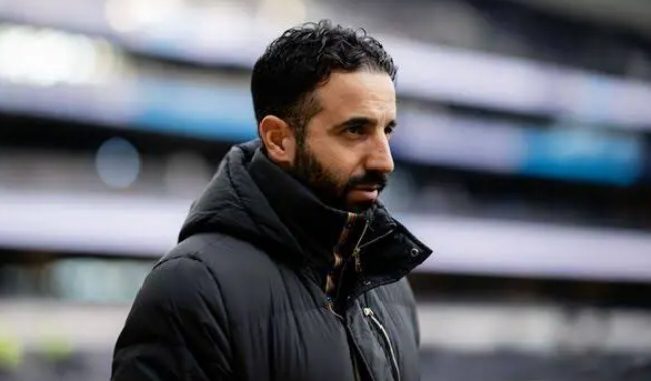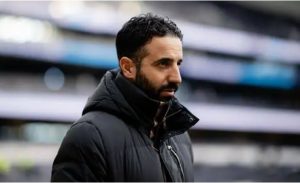
“I’ll Walk Away Without Compensation If Man Utd Don’t Want Me” – Ruben Amorim
In the emotionally charged aftermath of Manchester United’s disappointing 1-0 defeat to Tottenham Hotspur in the 2025 UEFA Europa League final, the spotlight turned swiftly from the players to the man at the helm—Ruben Amorim. The Portuguese tactician, who was appointed to lead Manchester United through a turbulent rebuild, faced growing scrutiny following a season that yielded no silverware and a disastrous 16th-place finish in the Premier League.
But in a post-match press conference that blended accountability with candor, Amorim addressed mounting speculation about his future in the boldest way yet: “If Manchester United no longer believe I’m the right person, I will walk away — and I will not ask for compensation.”
His statement shocked fans, pundits, and club insiders alike. In an era where high-profile managers typically have long, iron-clad contracts with massive buyouts, Amorim’s declaration stood out for its selflessness and deep-rooted professionalism. It was not just a soundbite—it was a message that underscored the weight of responsibility he carries and the standards he holds himself to.
—
A Season of Struggle
Amorim took charge of Manchester United in the summer of 2024, with high expectations. He had arrived with a glowing résumé from Sporting CP, where he had turned a struggling club into Portuguese champions, playing an energetic, pressing-based style of football admired across Europe.
But the transition to England has proven difficult.
Manchester United’s 2024–25 season was chaotic from the outset. Key players underperformed, the team struggled with injuries, and Amorim’s tactical ideas were slow to take hold. At times, his preferred 3-4-3 formation looked promising, but more often than not, United lacked cohesion, direction, and identity.
They were eliminated early from the FA Cup and failed to mount any serious Premier League challenge, finishing just above the relegation zone—a nadir for a club of United’s stature. The Europa League became the one bright spot in an otherwise bleak campaign, but even that ended in heartbreak in Bilbao.
—
Honesty in the Face of Failure
Rather than deflect blame or blame his players, Amorim accepted full responsibility for United’s underperformance.
“I know where the club belongs,” he said after the defeat. “We didn’t meet expectations, and for that, I have to look at myself first. If the board, the players, or the fans believe I’m not the right person, I’ll go. And I’ll go without asking a single pound.”
That declaration reverberated throughout the football world. Managers rarely take such a stance, especially at top clubs where lucrative severance packages are the norm. But Amorim’s decision to tie his future to merit, not money, revealed a deep commitment to the values of accountability and respect.
For a club dealing with internal instability, a divided fan base, and widespread skepticism about its direction, Amorim’s honesty might be exactly what is needed to rebuild trust—whether or not he remains in the role.
—
Backing from Bruno Fernandes
Club captain Bruno Fernandes was quick to defend Amorim after the final, despite his own struggles during the match. “He’s the right man for this job,” Fernandes said. “We all have to take responsibility, not just the manager. If we fail as a team, it’s on all of us.”
Fernandes’ words echoed the sentiments of some fans who, while disappointed with the results, recognize that United’s issues run deeper than the manager’s tactics. Years of poor recruitment, inconsistent leadership from the board, and a revolving door of managers have all contributed to the club’s ongoing decline.
Amorim, in contrast, represents a longer-term vision—one that requires patience and structural backing, rather than the short-term, result-driven culture that has plagued the club since Sir Alex Ferguson’s retirement.
—
What Went Wrong?
While Amorim has accepted the blame, it’s worth examining the broader context of United’s failure this season.
1. Injuries: The team suffered critical injuries at key moments, particularly in defense, where Lisandro Martínez and Raphaël Varane missed large parts of the campaign.
2. Underperforming Stars: Players like Marcus Rashford, Antony, and Casemiro failed to deliver consistently, while younger talents struggled to find their footing under pressure.
3. Lack of Consistency in Selection: Amorim’s attempts to rotate and find the right balance were hampered by form and fitness. The constant chopping and changing disrupted team chemistry.
4. Poor Recruitment: The club’s recruitment over recent seasons has failed to produce a balanced squad. Several signings have not justified their fees, adding pressure on Amorim to succeed with a flawed roster.
5. Cultural Instability: United remains a club in search of a footballing identity. The managerial changes, from Solskjær to Rangnick to Ten Hag to Amorim, have left a legacy of mixed styles and confused tactics.
—
The Board’s Decision
Now, the Manchester United hierarchy faces a critical decision. Amorim’s offer to step aside without compensation removes the financial obstacle that often complicates managerial changes. But the question is: should they take him up on it?
Some fans and pundits argue that Amorim deserves another season, particularly given the flashes of tactical clarity and improved youth integration seen late in the campaign. Others believe a fresh start is needed altogether, potentially with a manager more familiar with English football.
Either way, the board’s choice will shape the direction of the club for years to come. Amorim’s gesture has handed the power back to the institution — and, in doing so, re-centered the conversation on what’s best for Manchester United, not just what’s best for the individual.
—
A Rare Integrity
In modern football, where money, ego, and PR often dominate the narrative, Ruben Amorim’s words struck a different tone. His willingness to forgo a buyout and walk away if the club loses faith in him is a reminder of the integrity that once defined the sport.
For Manchester United fans, many of whom have grown disillusioned over a decade of mismanagement, Amorim’s stance may be seen as a breath of fresh air. Whether or not he remains at the helm, his approach has set a standard—one rooted in accountability, humility, and purpose.
As the dust settles on a difficult season, one thing is clear: Ruben Amorim may not have delivered results, but he’s brought back something that’s been missing at Old Trafford for a long time—honesty.
—
Would you like a shorter version of this for social media or a summary for an article post?

Leave a Reply